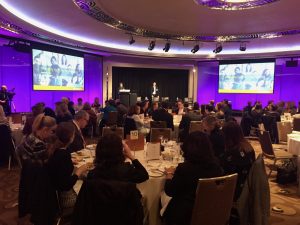Commissioner of the National Mental Health Commission Lucy Brogden addressed Senior HR and Business Executives as keynote speaker and panelist at iHR Australia’s Executive Luncheon in Melbourne on Friday. Held at the Grand Hyatt, the event attracted an audience of over 100 professionals from top Australian and international organisations. The iHR Australia luncheon on Driving & Managing Performance in the Context of Mental Ill Health in the Workplace provided a forum to share insights, experiences and discussion on challenges and best practice in relation to this complex and important topic. Over 100 Senior HR and Business Executives attended the Executive Lunch…
Commissioner of the National Mental Health Commission Lucy Brogden addressed Senior HR and Business Executives as keynote speaker and panelist at iHR Australia’s Executive Luncheon in Melbourne on Friday. Held at the Grand Hyatt, the event attracted an audience of over 100 professionals from top Australian and international organisations.
The iHR Australia luncheon on Driving & Managing Performance in the Context of Mental Ill Health in the Workplace provided a forum to share insights, experiences and discussion on challenges and best practice in relation to this complex and important topic.

 Over 100 Senior HR and Business Executives attended the Executive Lunch event
Over 100 Senior HR and Business Executives attended the Executive Lunch event
To lead this discussion, Lucy was joined by fellow panelists Nicolette Barnard, HR Head Pacific Region – Siemens, Dr Leigh Hodder – Consulting Psychologist – iHR Australia and Dr Verena Marshall – Senior Workplace Relations Adviser.

A survey of event attendees, predominantly made up of Senior HR Executives, revealed that 90% had seen a visible increase in mental ill-health issues presenting in the workplace over the past 5 years. This trend is confirmed by reports from the World Health Organisation showing that by the year 2030 mood disorders will be the greatest burden of disease. Encouragingly, nearly half of event attendees perceived this topic as being a top priority for their organisation and 42% stated their organisation had a policy on mental ill-health. Whist these statistics are reflective of the incredible efforts many modern workplaces have taken to tackle this issue, it is indicative of the substantial work that remains.
Commissioner Brogden suggests that implementing initiatives with the aim of improving morale and well-being of staff such as yoga, fruit bowls, engagement surveys and hot desking are insufficient without a more complete approach through leadership, culture and well-defined purposeful jobs.


“The well being of people needs to be the highest law” says Commissioner Lucy Brogden
Key strategies presented during the panel include*:
1. A holistic approach is required throughout the organisation to build a positive and safe work culture and starts with leaders role modelling supportive behaviour.
2. Case law indicates that employers must be proactive in asking all employees if there are impactors (at work or outside) affecting their ability to fulfil the inherent requirements of their job.
3. Providing managers with training on how to identify indicators of a mental health issue as well as how to conduct challenging conversations.

Panel discussion moderated by Stephen Bell, Managing Director – iHR Australia
The reality and impacts of mental ill health in the workplace are not something organisations can afford to hide from. It makes commercial sense for organisations to focus on building a supportive and positive workplace culture with leaders and managers trained to handle these sensitive and critical issues in a procedurally fair and appropriate manner.
For further information on the event or iHR Australia’s training on Mental Ill Health in the Workplace please contact info@ihraustralia.com
*Information and advice provided is professional and not legal
Recent articles
![Lee Witherden v DP World Sydney Limited [2025] FWC 294 (2) Workplace policies](https://ihraustralia.com/wp-content/uploads/bb-plugin/cache/Lee-Witherden-v-DP-World-Sydney-Limited-2025-FWC-294-2-1024x539-landscape-dc731230e07743843bfa2c830cc42561-.png)
Smart Workplace Policies, Stronger Cultures: Compliance Made Clear


